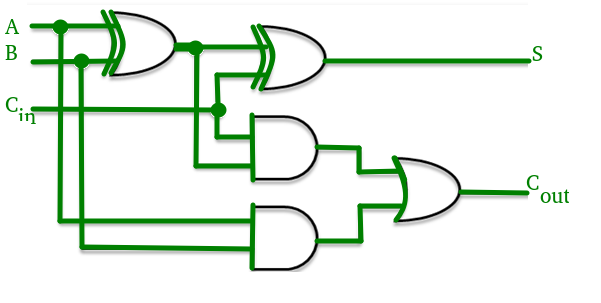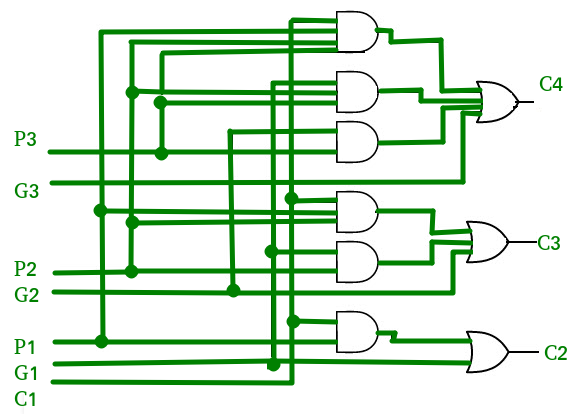Carry Look-Ahead Adder
The adder produce carry propagation delay while performing other arithmetic operations like multiplication and divisions as it uses several additions or subtraction steps. This is a major problem for the adder and hence improving the speed of addition will improve the speed of all other arithmetic operations. Hence reducing the carry propagation delay of adders is of great importance. There are different logic design approaches that have been employed to overcome the carry propagation problem. One widely used approach is to employ a carry look-ahead which solves this problem by calculating the carry signals in advance, based on the input signals. This type of adder circuit is called a carry look-ahead adder.
Here a carry signal will be generated in two cases:
- Input bits A and B are 1
- When one of the two bits is 1 and the carry-in is 1.
In ripple carry adders, for each adder block, the two bits that are to be added are available instantly. However, each adder block waits for the carry to arrive from its previous block. So, it is not possible to generate the sum and carry of any block until the input carry is known. The block waits for the
block to produce its carry. So there will be a considerable time delay which is carry propagation delay.

Consider the above 4-bit ripple carry adder. The sum is produced by the corresponding full adder as soon as the input signals are applied to it. But the carry input
is not available on its final steady-state value until carry
is available at its steady-state value. Similarly
depends on
and
on
. Therefore, though the carry must propagate to all the stages in order that output
and carry
settle their final steady-state value.
The propagation time is equal to the propagation delay of each adder block, multiplied by the number of adder blocks in the circuit. For example, if each full adder stage has a propagation delay of 20 nanoseconds, then will reach its final correct value after 60 (20 × 3) nanoseconds. The situation gets worse, if we extend the number of stages for adding more number of bits.
Carry Look-ahead Adder :
A carry look-ahead adder reduces the propagation delay by introducing more complex hardware. In this design, the ripple carry design is suitably transformed such that the carry logic over fixed groups of bits of the adder is reduced to two-level logic. Let us discuss the design in detail.


Consider the full adder circuit shown above with corresponding truth table. We define two variables as ‘carry generate’ and ‘carry propagate’
then,
The sum output and carry output can be expressed in terms of carry generate and carry propagate
as
where produces the carry when both
,
are 1 regardless of the input carry.
is associated with the propagation of carry from
to
.
The carry output Boolean function of each stage in a 4 stage carry look-ahead adder can be expressed as
From the above Boolean equations we can observe that does not have to wait for
and
to propagate but actually
is propagated at the same time as
and
. Since the Boolean expression for each carry output is the sum of products so these can be implemented with one level of AND gates followed by an OR gate.
The implementation of three Boolean functions for each carry output (,
and
) for a carry look-ahead carry generator shown in below figure.


Comments
Post a Comment